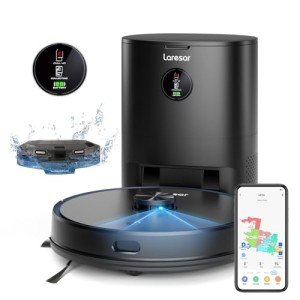The Most Sour Advice We've Ever Seen About Autonomous Vacuum Autonomous Vacuum
The Rise of Autonomous Vacuums: Revolutionizing Home Cleaning
In the age of technology, home chores are ending up being progressively automated, and one of the most noteworthy advancements in this world is the autonomous vacuum. These intelligent cleaning robots are designed to ease the drudgery of conventional vacuuming, making them popular amongst time-strapped homes. robot vacuum and mop UK explores the advancement, performance, advantages, and constraints of autonomous vacuums, together with a contrast of some of the leading models on the market today.
What is an Autonomous Vacuum?
An autonomous vacuum, also known as a robotic vacuum cleaner, is a small, automated gadget that navigates through your home to tidy floors without human intervention. Geared up with sensing units, cams, and advanced software application, these vacuums can detect challenges, prevent stairs, and optimize cleaning courses. robot mop and vacuum operate from a rechargeable battery, going back to their charging stations when their power is low or when cleaning tasks are finished.
Key Features of Autonomous Vacuums
Smart Navigation:
- Utilizes sensing units and algorithms to map the environment.
- Can navigate complicated layouts and prevent obstacles.
Scheduling:
- Allows users to set cleaning times.
- Can operate when your home is empty, guaranteeing minimal disruption.
Connectivity:
- Many models link to Wi-Fi, permitting app control and integration with smart home systems.
- Users can personalize settings, check cleaning status, and get notifications through mobile applications.
Suction Power:
- Varies between models; some offer adjustable suction settings for different floor types.
- High-end designs feature powerful suction capable of getting family pet hair and deep dirt.
Floor Type Adaptability:
- Capable of cleaning carpets, hardwood, tiles, and more.
- Certain models specialize in customized cleaning for multiple surfaces.
The Advantages of Using Autonomous Vacuums
1. Time-Saving
One of the most significant benefits of autonomous vacuums is the amount of time they save. Rather than investing hours pushing a traditional vacuum, homeowners can set robotic vacuums to tidy while they are taken part in other activities.
2. Consistent Cleaning Schedule
With the ability to arrange cleanings, these vacuums ensure that areas are frequently cleaned up, causing a cleaner home in general. Routine cleaning assists preserve indoor air quality, specifically for households with allergic reactions or asthma.
3. Smart Home Integration
Numerous autonomous vacuums can be incorporated with clever home systems for seamless operation. Property owners can manage their vacuums through voice commands through devices like Amazon Alexa or Google Assistant, improving user convenience.
4. Compact Design
The slim profile of these gadgets enables them to clean up under furnishings, such as sofas and beds, where conventional vacuums often can not reach.
5. Pet-Friendly
For family pet owners, autonomous vacuums can be a game-changer, as they are often equipped with specialized features for getting pet hair and dander, contributing to a cleaner home environment.
Limitations of Autonomous Vacuums
Despite their lots of advantages, autonomous vacuums also have limitations:
1. Restricted Deep Cleaning
While these vacuums effectively keep cleanliness, they may not change the effectiveness of a deep clean provided by traditional vacuums, particularly for greatly stained locations.
2. Capacity Constraints
A lot of autonomous vacuums featured small dust bins that require to be cleared often, specifically in bigger homes or homes with animals. This can be a trouble for some users.
3. Navigation Challenges
Although navigation technology is continuously improving, some designs might have a hard time with particular designs, particularly complex spaces with many obstacles or extremely small spaces.
4. Rate Point
While rates have actually become more available, high-end models can still be rather costly, posturing a barrier for some customers.
Contrast of Top Autonomous Vacuum Models
Design
Smart Features
Battery Life
Suction Strength
Cost Range
iRobot Roomba 980
App Control, Voice Assistant
120 minutes
1700 Pa
₤ 700 – ₤ 900
Roborock S6 MaxV
Advanced Mapping, Connectable
180 minutes
2500 Pa
₤ 600 – ₤ 800
Ecovacs Deebot Ozmo
Mopping, Smart Home
110 minutes
1500 Pa
₤ 450 – ₤ 700
Neato Botvac D7
Laser Navigation, Custom Zones
120 minutes
2000 Pa
₤ 800 – ₤ 900
Shark IQ Robot
Self-Emptying Base, Smart Map
90 minutes
1500 Pa
₤ 400 – ₤ 600
Noteworthy Takeaways
- Smart Features: Consumers must focus on models using robust smart features for convenience and efficiency.
- Battery Life: A longer battery life is advantageous for larger living areas.
- Suction Strength: Depending on home requirements, varying suction power can considerably impact cleaning efficiency.
FAQs about Autonomous Vacuums
Q1: How do I keep my autonomous vacuum?
A: Regular maintenance consists of cleaning the brushes, emptying the dustbin, and examining for obstructions. In addition, keeping the sensing units clean up will help maintain navigation precision.
Q2: Can robotic vacuums tidy rugs and carpets?
A: Yes, many robotic vacuums are developed to efficiently clean both tough surface areas and carpets. However, suction power may differ based on the design.
Q3: Do robotic vacuums require Wi-Fi?
A: While lots of autonomous vacuums benefit from Wi-Fi connectivity for app control and updates, some models can run individually without a cordless connection.
Q4: How frequently should I run my robotic vacuum?
A: It depends upon your living situation, however running it several times a week is often suggested, particularly for homes with family pets.
In conclusion, autonomous vacuums represent a substantial development in home cleaning innovation, appealing convenience and efficiency. While these gadgets might not totally change standard vacuum, they are undoubtedly valuable in maintaining a tidy living environment. As innovation continues to evolve, the future of home cleaning looks appealing, and these devices are at the leading edge of the transformation.
